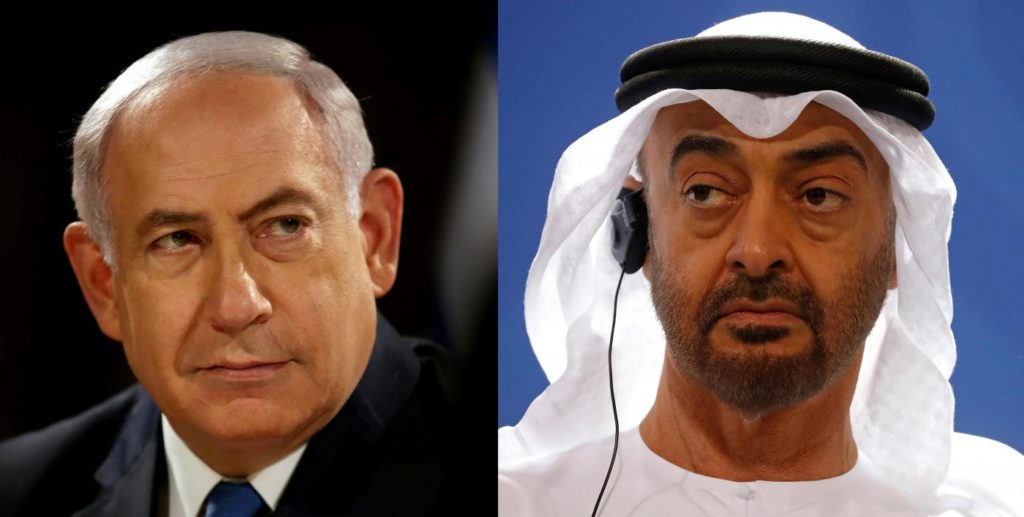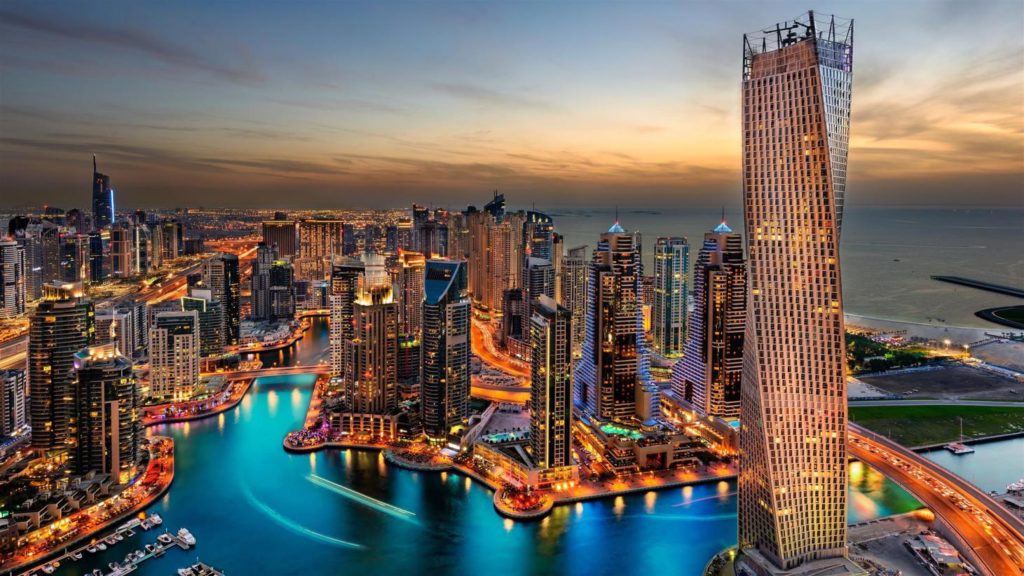Australia/Israel Review
Out of the blue, a new alliance
Sep 1, 2020 | Amotz Asa-El

Announced out of the blue, the fourth Arab-Israeli peace deal in 41 years seems set to be the simplest, happiest, and most lucrative.
Struck between Prime Minister Binyamin Netanyahu and United Arab Emirates Crown Prince Mohammed bin Zayed (MBZ), and mediated by President Donald Trump, the deal caught everyone in Israel off guard, even though extensive commercial relations between the two countries have been an open secret for years.
Publicised in a joint statement, together with Washington, the deal said the two countries “agreed to the full normalisation of relations.” Israeli and Emirati teams are already discussing the agreement’s terms in Abu Dhabi, and diplomats said the deal will be signed at a public ceremony in Washington, probably in September.
The Emirati move did not come without a price. Firstly, Netanyahu agreed to suspend previous plans to apply Israeli sovereignty to parts of the West Bank in line with the US Trump Administration’s peace plan. Second, according to Israeli media reports, Israel agreed not to oppose Washington’s sale of its advanced fighter jet, the F-35, to the UAE military.
Netanyahu has denied the F-35 report, saying Israel continues to oppose American sales of weapons that might hinder Israel’s qualitative edge over any Middle Eastern military. Concerning the application of sovereignty, he has claimed such a move remains “on the agenda,” even though the Trump Administration’s Middle East envoy, Jared Kushner, has said that Israel “agreed with us that they will not move forward [on applying sovereignty] without our consent.”
Despite this dissonance, there is broad agreement in Israel that the deal is historic, and in some ways even more substantive than the deals signed with Egypt, the Palestinians and Jordan respectively in 1979, 1993, and 1994.
Unlike Israel’s previous peace partners, the UAE is both geographically distant and wealthy.
Located in the Arabian Peninsula’s north-eastern tip, the confederation of seven sheikhdoms is almost 2,000 kilometres from Israel, and is halfway between Tel Aviv and Mumbai. Though a member of the Arab League since gaining independence in 1971, the UAE has never technically been at war with Israel, which is why the agreement signed between Jerusalem and Abu Dhabi will formally be not a “peace agreement”, but a normalisation pact.

Dubai’s modern, forward-looking outlook matches up well with Israel
Normalisation will apparently mean an exchange of ambassadors, direct flights, tourism and fully open trade. Considering that the UAE’s per-capita GDP, at US$70,000, is among the world’s ten highest, and with its sovereign wealth funds totalling more than US$1 trillion, the deal clearly opens up new economic horizons for both parties.
Having used its oil and gas wealth to build a diversified economy, the UAE is now an international transportation hub whose national airline, Emirates, is considered one of the best in the world, while its financial capital, Dubai, has long succeeded Beirut as the Middle East’s banking centre.
The deal’s first noticeable result is expected to be an influx of Israeli tourists. Though distant compared with Jordan and Egypt, Dubai is a mere three-hour flight from Ben Gurion Airport, and its combination of glitzy hotels and affordable prices seems custom-tailored for the middle-income Israeli vacationers who flock to destinations like Greece, Cyprus, Turkey and Spain annually.
More substantively, the UAE’s financial sector is expected to join American, European, and Far Eastern investors who have been buying into Israel’s advanced hi-tech, biomed and agritech sectors since the 1990s. A harbinger of this future emerged three days after the agreement’s announcement, when the Emirati investment company Apex and Israeli R&D firm Tera Group signed a deal to jointly develop a coronavirus testing device.
The UAE is also expected to buy Israeli defence goods, the F-35 brouhaha notwithstanding. With a US$23 billion defence budget, and with its arch-enemy Iran a mere 140 kilometres across the Persian Gulf from Dubai, the UAE has reportedly already been buying drones and radar systems from companies like Rafael and Israel Aerospace Industries, as well as cyberwarfare products from Israeli software makers.
Unlike Israel’s trade with Egypt and Jordan, which is dominated by long-term deals for Israeli natural gas, energy is not expected to play much of a role in Israeli-Emirati trade. The UAE, with the world’s seventh-largest oil reserves, doesn’t need Israeli gas. Israel, for its part, today not only has its own gas, but has an assortment of steady, long-term suppliers of petroleum, such as Azerbaijan and Russia, on which it can rely.
Trade will therefore be about finished goods, venture capital, and thousands of tourists, both Israeli vacationers on the Gulf’s shores and Emirati pilgrims in Jerusalem’s mosques.
In all, Israeli-Emirati trade is expected to quickly surpass US$1 billion, fueled by tourism and services, but dominated by defence. And defence is in this case about the two countries’ shared enemy – Iran. That is why, despite its exciting economics, the deal’s most important dimension is diplomatic.
The Emirati move, driven by its Western-educated leader’s hostility to fundamentalism, is bold because of its departure from pan-Arab policy.
Since 2002, when the Arab League formally adopted the so-called Saudi Peace Plan, Arab governments maintained that normalisation of relations with Israel must follow rather than precede an Israeli-Palestinian peace settlement. That settlement, in its turn, would have to include the establishment of a Palestinian state in the West Bank, Gaza and east Jerusalem, Israeli withdrawal from the Golan Heights, and “a just settlement” of the Palestinian refugee problem in line with UN Resolution 194 – implying a so-called “right of return” to Israel.
The Emirati move has changed this.
The move was welcomed by Egyptian President Abdel Fatah al-Sisi, who called MBZ to congratulate him on “the historic peace step,” and also tweeted his “appreciation” to the parties for “taking steps to bring peace in the Middle East.”
Sisi’s endorsement underlines the Palestinian problem’s steady marginalisation amongst key Arab states. However, hopes that the Emirati decision would quickly spread to neighbouring countries seem premature for now.
Saudi Foreign Minister Prince Faisal bin Farhan, speaking in Berlin, said his government will establish diplomatic ties with Israel only after it strikes a peace deal with the Palestinians.
This may mean that Bahrain, which initially welcomed the UAE-Israel deal as “advancing the region toward peace,” might defy forecasts that it will follow the UAE’s example. The tiny kingdom, an islet of 1.6 million inhabitants 23 kilometres off Saudi Arabia’s eastern coast, is effectively a political satellite of Riyadh.
Another candidate to follow the UAE’s move was Sudan, whose foreign ministry’s spokesman Haidar Badawi Sadiq told Sky News that Khartoum and Jerusalem were engaged in a dialogue, adding that Sudan wants to make peace with Israel and that “there is no reason for enmity to continue.”
The following day, however, Sadiq was fired by acting Foreign Minister Omar Qamar al-Din, who denied contacts with Israel and said he was “astonished” by his aide’s statement.
These setbacks are in addition to the open hostility with which the Emirati move was met by the Palestinian Authority (PA), which called it “despicable” and “a betrayal,” and prompted PA President Mahmoud Abbas to recall the PA’s ambassador from Abu Dhabi.
Turkey toed the PA line, with its foreign ministry accusing the UAE of “hypocritical behaviour” as President Recep Erdogan threatened to recall Ankara’s ambassador as well.
Even so, from Israel’s viewpoint the deal is a major breakthrough, which former head of Mossad Shabtai Shavit said was, in some ways, even more significant than the path-breaking peace with Egypt.
The 81-year-old Shavit’s enthusiasm reflects sentiments elsewhere in the Israeli left, with which he has become identified during his second career as a businessman. In the political centre, opposition leader Yair Lapid called the move “important” and sent “blessings to Netanyahu and Trump.”
However, the Israeli right protested the terms of the deal. “Netanyahu missed an opportunity that comes once in a hundred years,” said former defence minister Naftali Bennett, referring to the shelving of the West Bank sovereignty plans.
Bennett’s position is pivotal, since his Yemina party, which now holds a mere six Knesset seats, had been forecast to treble its following at the time news of the peace deal broke.
Netanyahu and the Likud, at the same time, had plunged from 36 to 30 seats in the polls, reflecting dismay with the government’s handling of the coronavirus pandemic and the recession it caused.
Meanwhile, Netanyahu has been flirting with the possibility of an early election, the fourth within less than two years, hoping to perhaps restore the right-wing coalition he headed before election results forced him into a coalition with the centrist Blue and White party, and to forestall his agreement to turn over the premiership to Blue and White leader Benny Gantz in October next year.
Ultimately, legislation passed on Aug. 24 extended a legal deadline to pass a budget, thus averting a fourth general election within 20 months. However, Likud and Blue and White must still hammer out and jointly pass a budget by Dec. 31 if their coalition is to remain intact.
Netanyahu kept Blue and White’s leaders, Defence Minister Benny Gantz and Foreign Minister Gabi Ashkenazi, largely in the dark about his talks with MBZ, informing them about the agreement only on the day it was made public.
Netanyahu apparently wanted the popular move to be seen as his personal and exclusive achievement.
Yet recent polls suggest the peace deal offset Netanyahu’s declining political fortunes only marginally, with Likud rising slightly at Bennett’s expense.
If Netanyahu indeed intends to use the peace deal as a springboard to call an early election after the December deadline, he will be gambling on diplomatic optimism overpowering pandemic pessimism. That would be a brave throw of the dice, since voters might conclude that, even if Netanyahu alone is responsible for the new friend Israel has gained, then he is also the one responsible for the jobs so many Israelis have lost.
Tags: Gulf states, Israel, Middle East, UAE






